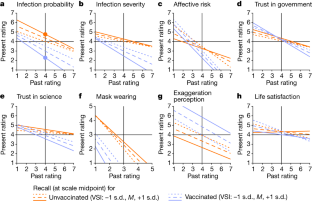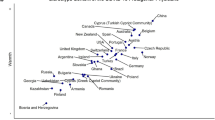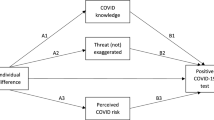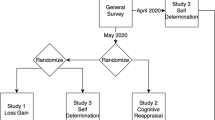Abstract
How people recall the SARS-CoV-2 pandemic is likely to prove crucial in future societal debates on pandemic preparedness and appropriate political action. Beyond simple forgetting, previous research suggests that recall may be distorted by strong motivations and anchoring perceptions on the current situation1,2,3,4,5,6. Here, using 4 studies across 11 countries (total n = 10,776), we show that recall of perceived risk, trust in institutions and protective behaviours depended strongly on current evaluations. Although both vaccinated and unvaccinated individuals were affected by this bias, people who identified strongly with their vaccination status—whether vaccinated or unvaccinated—tended to exhibit greater and, notably, opposite distortions of recall. Biased recall was not reduced by providing information about common recall errors or small monetary incentives for accurate recall, but was partially reduced by high incentives. Thus, it seems that motivation and identity influence the direction in which the recall of the past is distorted. Biased recall was further related to the evaluation of past political action and future behavioural intent, including adhering to regulations during a future pandemic or punishing politicians and scientists. Together, the findings indicate that historical narratives about the COVID-19 pandemic are motivationally biased, sustain societal polarization and affect preparation for future pandemics. Consequently, future measures must look beyond immediate public-health implications to the longer-term consequences for societal cohesion and trust.
This is a preview of subscription content, access via your institution
Access options
Access Nature and 54 other Nature Portfolio journals
Get Nature+, our best-value online-access subscription
$29.99 / 30 days
cancel any time
Subscribe to this journal
Receive 51 print issues and online access
$199.00 per year
only $3.90 per issue
Buy this article
- Purchase on Springer Link
- Instant access to full article PDF
Prices may be subject to local taxes which are calculated during checkout



Similar content being viewed by others
Data availability
Data are available at https://doi.org/10.17605/OSF.IO/BXG7V. Study 2 (https://aspredicted.org/uw47f.pdf) and study 3 (https://aspredicted.org/kk33k.pdf) were preregistered.
Code availability
Data analysis scripts are available at https://doi.org/10.17605/OSF.IO/BXG7V.
References
Schacter, D. L., Guerin, S. A. & St. Jacques, P. L. Memory distortion: an adaptive perspective. Trends Cogn. Sci. 15, 467–474 (2011).
Newman, E. J. & Lindsay, D. S. False memories: what the hell are they for? Appl. Cogn. Psychol. 23, 1105–1121 (2009).
Wilson, A. & Ross, M. The identity function of autobiographical memory: time is on our side. Memory 11, 137–149 (2003).
Murphy, G., Loftus, E. F., Grady, R. H., Levine, L. J. & Greene, C. M. False memories for fake news during Ireland’s abortion referendum. Psychol. Sci. 30, 1449–1459 (2019).
Calvillo, D. P., Harris, J. D. & Hawkins, W. C. Partisan bias in false memories for misinformation about the 2021 U.S. Capitol riot. Memory 31, 137–146 (2023).
Schacter, D. L., Greene, C. M. & Murphy, G. Bias and constructive processes in a self-memory system. Memory https://doi.org/10.1080/09658211.2023.2232568 (2023).
Lenharo, M. WHO declares end to COVID-19’s emergency phase. Nature https://doi.org/10.1038/d41586-023-01559-z (05 May 2023).
Betsch, C., Wieler, L. H. & Habersaat, K. Monitoring behavioural insights related to COVID-19. Lancet 395, 1255–1256 (2020).
Greene, C. M., De Saint Laurent, C., Hegarty, K. & Murphy, G. False memories for true and false vaccination information form in line with pre‐existing vaccine opinions. Appl. Cogn. Psychol. 36, 1200–1208 (2022).
Simmank, J. & Schneider, J. War alles anders? ZEIT Online https://www.zeit.de/gesundheit/2022-09/corona-massnahmen-lockdown-kritik-querdenker (2022).
Herz, H., Kistler, D., Zehnder, C. & Zihlmann, C. Hindsight Bias and Trust in Government: Evidence from the United States. CESifo Working Paper No. 9767 https://doi.org/10.2139/ssrn.4123827 (SSRN, 2022).
Giroux, M. E., Derksen, D. G., Coburn, P. I. & Bernstein, D. M. Hindsight bias and COVID-19: hindsight was not 20/20 in 2020. J. Appl. Res. Mem. Cogn. 12, 105–115 (2023).
Bor, A., Jørgensen, F. & Petersen, M. B. Discriminatory attitudes against unvaccinated people during the pandemic. Nature 613, 704–711 (2023).
Henkel, L., Sprengholz, P., Korn, L., Betsch, C. & Böhm, R. The association between vaccination status identification and societal polarization. Nat. Hum. Behav. 7, 231–239 (2023).
Korn, L., Böhm, R., Meier, N. W. & Betsch, C. Vaccination as a social contract. Proc. Natl Acad. Sci. USA 117, 14890–14899 (2020).
West, T. V. & Kenny, D. A. The truth and bias model of judgment. Psychol. Rev. 118, 357–378 (2011).
Zimmermann, F. The dynamics of motivated beliefs. Am. Econ. Rev. 110, 337–363 (2020).
Saucet, C. & Villeval, M. C. Motivated memory in dictator games. Games Econ. Behav. 117, 250–275 (2019).
Devine, P. G., Forscher, P. S., Austin, A. J. & Cox, W. T. L. Long-term reduction in implicit race bias: a prejudice habit-breaking intervention. J. Exp. Soc. Psychol. 48, 1267–1278 (2012).
Carnes, M. et al. The effect of an intervention to break the gender bias habit for faculty at one institution: a cluster randomized, controlled trial. Acad. Med. 90, 221–230 (2015).
Hossain, T. & Okui, R. The binarized scoring rule. Rev. Econ. Stud. 80, 984–1001 (2013).
Van Der Zwet, K., Barros, A. I., Van Engers, T. M. & Sloot, P. M. A. Emergence of protests during the COVID-19 pandemic: quantitative models to explore the contributions of societal conditions. Humanit. Soc. Sci. Commun. 9, 68 (2022).
Dryhurst, S. et al. Risk perceptions of COVID-19 around the world. J. Risk Res. 23, 994–1006 (2020).
Petersen, M. B., Osmundsen, M. & Arceneaux, K. The need for “chaos” and motivations to share hostile political rumors. Am. Polit. Sci. Rev. https://doi.org/10.1017/S0003055422001447 (2023).
Müller, M. W. Selective Memory around Big Life Decisions. Working Paper https://fass.nus.edu.sg/ecs/wp-content/uploads/sites/4/2022/08/MuellerMW_SelectiveMemory.pdf (2022).
Levine, L. J., Prohaska, V., Burgess, S. L., Rice, J. A. & Laulhere, T. M. Remembering past emotions: the role of current appraisals. Cogn. Emot. 15, 393–417 (2001).
Acknowledgements
We thank J. Simmank and J. Schneider for discussions about the ex-post evaluation of the pandemic and for input for the items to assess the appropriateness of political action; S. Columbus, M. Müller and F. Zimmermann for comments and suggestions; and the COSMO teams at the University of Erfurt and the Bernhard Nocht Institute for Tropical Medicine for their continuous work, on which this paper builds. Financial support by the following institutions is acknowledged: Federal Centre for Health Education, Robert Koch Institute, Leibniz Institute of Psychology, Bernhard Nocht Institute for Tropical Medicine, Klaus Tschira Foundation, Thüringer Ministerium für Wirtschaft, Wissenschaft und digitale Gesellschaft, Thüringer Staatskanzlei, University of Erfurt and Deutsche Forschungsgemeinschaft (DFG; German Research Foundation). The project was partly funded by the DFG under Germany’s Excellence Strategy: EXC 2126/1–390838866. Support from the DFG through CRC TR 224 (project A01) is also acknowledged. C.B. was partly funded by the DFG (BE3970/12-1) and the Leibniz Foundation (P106/2020). The funders had no role in study design, data collection and analysis, decision to publish or preparation of the manuscript.
Author information
Authors and Affiliations
Contributions
All authors designed and performed the research. P.S. and L.H. performed the data analyses. All authors wrote and revised the manuscript.
Corresponding author
Ethics declarations
Competing interests
The authors declare no competing interests.
Peer review
Peer review information
Nature thanks Dustin Calvillo and the other, anonymous, reviewer(s) for their contribution to the peer review of this work. Peer reviewer reports are available.
Additional information
Publisher’s note Springer Nature remains neutral with regard to jurisdictional claims in published maps and institutional affiliations.
Extended data figures and tables
Extended Data Fig. 1 Predictors of appropriateness of political action in study 1.
Results of a multiple linear regression with vaccination status and vaccination status identification predicting perceived appropriateness of political measures to contain the COVID-19 pandemic. Ribbons visualize 95% confidence intervals; R2 = 0.482.
Extended Data Fig. 2 Effects of interventions to reduce recall bias in study 2.
a–f, Linear regression predicting individual recall on the basis of past (December 2021) and present (January 2023) ratings and their interactions with vaccination status and experimental condition for infection probability (a), infection severity (b), trust in government (c), trust in science (d), mask wearing (e) and avoiding contacts (f) (n = 3,105). Each line visualizes directional bias and how past and present perceptions affect recall (at recall = 4) for a given vaccination status and experimental condition (see the Fig. 1 legend for details on how to read the figure).
Supplementary information
Rights and permissions
Springer Nature or its licensor (e.g. a society or other partner) holds exclusive rights to this article under a publishing agreement with the author(s) or other rightsholder(s); author self-archiving of the accepted manuscript version of this article is solely governed by the terms of such publishing agreement and applicable law.
About this article
Cite this article
Sprengholz, P., Henkel, L., Böhm, R. et al. Historical narratives about the COVID-19 pandemic are motivationally biased. Nature 623, 588–593 (2023). https://doi.org/10.1038/s41586-023-06674-5
Received:
Accepted:
Published:
Issue Date:
DOI: https://doi.org/10.1038/s41586-023-06674-5
This article is cited by
Comments
By submitting a comment you agree to abide by our Terms and Community Guidelines. If you find something abusive or that does not comply with our terms or guidelines please flag it as inappropriate.



